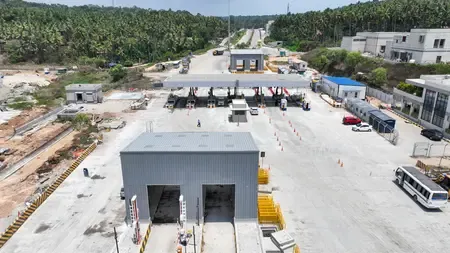Has Parliament Approved the Indian Ports Bill 2025?

Synopsis
Key Takeaways
- Unification of port laws for better governance.
- Establishment of State Maritime Boards for efficient management.
- Focus on sustainability through green initiatives.
- Creation of job opportunities in logistics and port operations.
- Reduction in logistics costs through improved efficiency.
New Delhi, Aug 18 (NationPress) The Rajya Sabha has given its nod to the Indian Ports Bill 2025 on Monday, aiming to unify laws concerning ports, encourage integrated port development, ease business operations, and maximize the effective use of India’s coastline.
After being passed by the Lok Sabha on August 12, the Bill is now set to be forwarded to the President of India for her approval.
This legislation was introduced in the Upper House by the Minister of Ports, Shipping and Waterways, Sarbananda Sonowal, amidst an uproar from the opposition regarding the Special Intensive Revision (SIR) of electoral rolls in Bihar.
The minister highlighted that the Bill seeks to establish and empower State Maritime Boards for the efficient management of ports that are not categorized as major ports, in addition to forming the Maritime State Development Council to support structured growth within the port sector.
The legislation mandates management of pollution, disasters, emergencies, security, safety, navigation, and data at ports; ensures adherence to India’s commitments under international agreements; implements conservation measures for ports; and provides adjudicatory frameworks for addressing port-related disputes, as explained by Sonowal.
Moreover, the Bill updates the antiquated provisions of the British-era Indian Ports Act, 1908, introducing modern regulations aimed at simplifying port procedures and digitizing operations to enhance the ease of doing business.
This legislation prioritizes sustainability by incorporating green initiatives, pollution control, and disaster management protocols for sustainable port advancement. It also strives to boost port competitiveness through transparent tariff policies and improved investment frameworks while maintaining uniform safety standards across all Indian ports.
The Indian Ports Bill, 2025 is anticipated to lower logistics costs by expediting cargo movement and enhancing connectivity. Additionally, it is projected to create substantial job opportunities in port operations, logistics, warehousing, and related sectors.
Furthermore, the Bill delineates stringent anti-pollution measures and eco-conscious port practices, contributing to a cleaner environment. Streamlined procedures and upgraded infrastructure will benefit exporters and MSMEs by reducing bottlenecks and facilitating smoother operations, as per an official statement.









